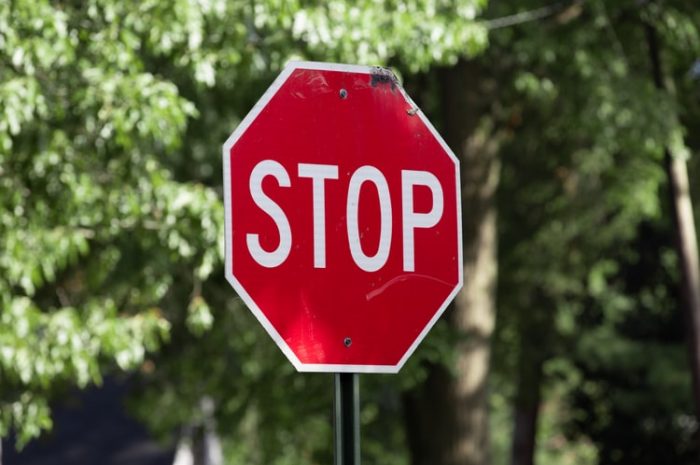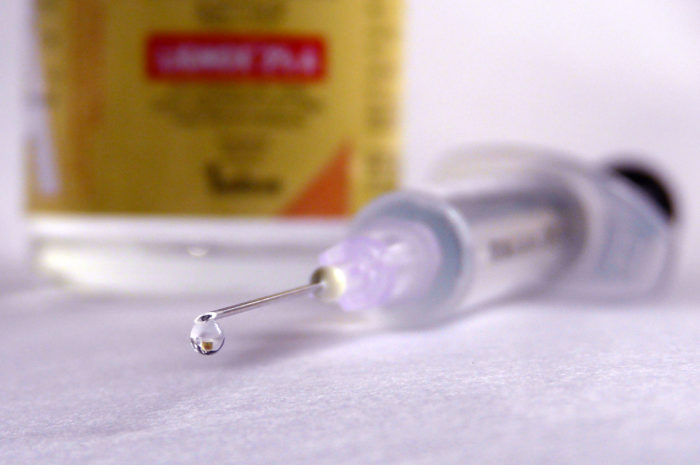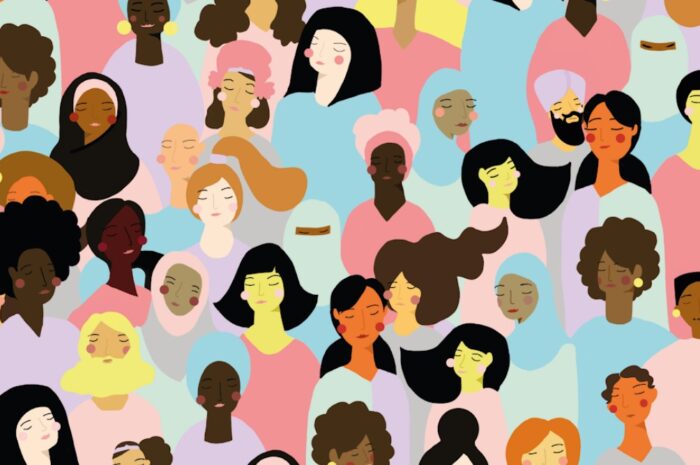
The Double-Edged Sword of Pain VS Pleasure
What Having Sex is Like with Endometriosis and Adenomyosis by Nikita Aashi Chadha
Photo by Dainis Graveris on SexualAlpha”
I’ve always been sexual as a person. Sex has been a big part of my life, and even my personality for as long as I can remember. My sex drive is extremely high, which is less fun than it sounds. I’m a woman and have spent most of my life conditioned to believe that my pleasure is irrelevant, and not needed within the bedroom. I’ve been taught that it comes second to my male partner. A lot of ex-boyfriends have hated on me for having the higher libido in the relationship, and there’s always an element of shame within this judgement – I should feel ashamed or embarrassed about expressing myself physically, and sexually.
I know that I’ve used sex to fill holes in my life or plaster over problems with my identity, self-esteem and body image. Especially concerning race, my position in the world, and belonging. I don’t fit into Eurocentric standards of beauty, which say I have to be thin, white, blonde-haired and blue-eyed to be considered beautiful. These restrictions around what beauty can be defined as have impacted my sense of self since I was a child. I’m 28, nearly 29, and it’s only in the last year that I’ve actually felt like I was beautiful. Brown and black women aren’t treated the same way as white women are. They are the ‘ideal’, the ‘standard’ of woman, but we are dehumanised as the ‘other’ and we are incredibly over-sexualised. Just look at the porn industry, where women of colour are expected to outperform their white colleagues, by being ‘primal’ or ‘animalistic’. Until a few years ago (and I mean 2-3) searching ‘Black girls’ on Google would return pornographic images and websites, ‘Indian girls’ too, but this was not the case if you searched ‘white girls’. This is directly caused by colonialism, where women of colour were seen as savage, less than human, and able to seduce colonial men, just by existing and looking ‘exotic’. Being fetishised for your race is a real issue and it looks different for every racial group as those colonial narratives weren’t the same for every woman. For me, it’s the assumption that I know the Kama Sutra or Tantric Sex practice, being expected to put on a show because I’m “wild” and “freaky”. Sometimes people reveal this attitude very quickly, and they are swiftly blocked. Sometimes, it isn’t revealed until we are actually having sex, which is awkward, and demeaning to say the least.
My attitude towards sex has changed as I’ve gotten older, especially since being diagnosed with Endometriosis and Adenomyosis, because both conditions shared a common symptom: pain before, during, or after sex. I’ve experienced pain during sex for quite a long time if I’m being honest, many years now. I didn’t know that it wasn’t normal. I’ve brought it up to several doctors, and never really had anyone pay attention to the symptom, or that encouraged me to look into what it means. There was never any rhyme or reason to it: sometimes, there would be no pain at all, other times, pain during the act itself which felt like sharp, stabbing sensations in the cervix, and usually, there would be residual pain for anywhere from 3 days to over a week. I would struggle to sit, stand, go to the bathroom, shower, or walk. I even mentioned painful sex to the GP, and she told me that it was normal.
“Sex can hurt everyone sometimes!”
Countless doctors, GPs and medical professionals
It was like something inside of me just switched off – I started to see sex as painful and it stopped being enjoyable, even alone! After my laparoscopy in late 2018, I had the Mirena coil inserted, and it just added to my pre-existing problems. As well as the standard pelvic, uterus, vaginal and lower-back pain, the coil brought a brand-new symptom: excruciating pain during orgasms, every, single, time. You can imagine my frustration experiencing this during SOLO play, already becoming less and less likely to actually want to have sex with another human being, and now, being limited again. I spoke to my gynaecologist about it, who again said that there was nothing to worry about. Not one medical professional has ever explained that Endometriosis and painful sex go hand-in-hand. No one ever wants to have these conversations, to the healthcare sector, we will always be ‘hysterical’ women who are not allowed to have control over their own sexual agency. Pain is expected, and ignored, where are the DRs who want to actually give us pain-relieving techniques? Or that want to listen to our stories of sexual dysfunction? Turns out, I also have Adenomyosis and was diagnosed 6 months later. I wondered if this could explain the new orgasm pain I was experiencing – I did ask, but again, wasn’t really given a concrete answer.
So, I turned to the Endo Community. I’ve always found more answers within Cysters, and other support networks and forums. Even within IG comments and threads; which says something. They are more useful to me than doctors have been (sorry not sorry) and that is embarrassing, for the doctors who have treated me, and for the NHS itself. The only explanation I’ve ever been able to find about what that orgasm pain is either:
- I had the coil removed a couple of months later, and it was very high up in one of the corners of my uterus, perhaps that contributed to the pain
- When you orgasm, the pelvic floor and uterus muscles are activated, they contract and retract at climax. Like with any other injury, if there is a problem within an associated area, or area near the pelvic floor, (like Endometriosis) this could cause further pain, dysfunction and inflammation.
The second explanation came from someone with the Endometriosis community and it makes the most sense to me. It was one of the only times that someone took the question seriously when I asked it and did not minimise my experiences so far. I’ve only really had sex a handful of times since being diagnosed, like 3 or 4 times in the last 3 years. Nothing like my young self at all. Those painful sexual experiences have really stayed with me. I know that sex will not be pain-free and I’ve actively avoided it as a consequence.
My body has always been a willing participant – but now it tenses up when I don’t want it to, it shuts me, and my desires down when I’m around other people. Thoughts of casual sex without trust, and without knowing the person on a deeper level isn’t on my radar (I’m not judging anyone who does this or wants to). When I have a flare, or experience Endo related pain, I don’t want to be touched or be around people. Sexual dysfunction, for lack of a better term, is quite an isolating experience. Being in control is definitely a part of the thin line between pain and pleasure, as I don’t have any problems with masturbation or self-exploration anymore. I feel more at peace when I’m alone when no one else’s input or feelings are involved. When I’m on my own, I don’t have to act or pretend I’m not in pain. I can just be, without fear, or judgement, shame or stigma – “you don’t look sick”, “you were fine two minutes ago”, “you can be so rude when you’re in pain”. It’s been an adjustment, that’s for sure and it’s changed my life in a lot of ways. I always found sex comforting, validating. My sexuality has formed a massive part of my identity over the years, without it, I do feel like a different person. I’m grateful that my illnesses have prompted me to look into my relationship with sex, and others, but sometimes, it feels like all I’ve done over the last few years is lose my ability to do things that I used to enjoy, or the things that make me who I am.
With all that being said, some factors should be considered if you’re like me, and you have Endometriosis/Adenomyosis, and you want to have sex. This is true of any kind of pain in that area:-
Communicating with your partner about sexual pain, or dysfunction:
- Set clear boundaries. Explain what kind of pain you experience, when you’re likely to experience it (i.e. during foreplay or sex), and what sexual activity is on or off the table
- Try to communicate this before sexual activity begins – you can and should also communicate how you feel during the activity itself
- Can you openly communicate about what you like and don’t like sexually? If you can’t talk to the person you’re sleeping with about these things, you probably shouldn’t be sleeping with them.
- Are they receptive to feedback? Will they take any comments as criticism? These are important things to consider.
Communicating with your partner about pleasure – or understanding it for yourself:
- Does the person you’re sleeping with know what you like, or how to please you?
- If they don’t, do you feel like you could tell them, or show them openly, what you like?
- Does this person care about your pleasure, and whether you have a good time?
- Do you know what feels good for you, and your body? Do you know how you like to be touched?
- If you’re not into solo play, I would advise it especially with people with chronic conditions – you can find out yourself, what you find pleasurable, and you can re-create that with your partner.
Sex is not just PENETRATIVE – there are other ways to have sex, and sexual activities that include 0 penetration at all:
- Sex is not just penetrative. If you’re with someone who tries to pressure you into anything, especially things that are painful, or that you do not like – this person does not care about you, or your feelings. No one that does, would do that to you.
- Do you find penetration difficult? Do you know what about it you struggle with: i.e. is it the pressure, or application? Is it the length of time? Is there anything else that you find more pleasurable that you’d rather focus on?
- Is your partner willing to explore and focus on other sexual activities, that don’t involve penetration?
- Are they willing to include a vibrator or sex toy into your sexual activities, if it would add more pleasure, and take away the pain? (I have experienced MANY times, men being intimidated by my sex toys, and judging me for them)
- Invest in some lube! Water-based to keep on hand, as oil-based will damage condoms
- There are a lot of products available now, like CBD vaginal suppositories, or oral tablets that can be taken before sexual activity.
The actual logistics of foreplay, and sexual activity:
- Do you know what sex positions feel good, and which cause pain? Have you shared this with your partner?
- Some positions allow us more control and are easier to bear for some people i.e. being on top, reverse cowgirl, spooning.
- Make sure any sexual aids are stocked up/charged and nearby, i.e. condoms, lubricant, sex toys etc.
- If you don’t feel like having sex, even during the sex itself, you should be able to communicate this to your partner, and they should be receptive to what you want and need.
If you’re sleeping with someone who doesn’t respect your pleasure or your boundaries, may I suggest throwing the whole person in the bin and starting again? 🙂
We may meet some people that do prioritise our sexual pleasure (and we should always be striving to be with someone who is like this) but there is nothing MORE important than you prioritising it for yourself.



